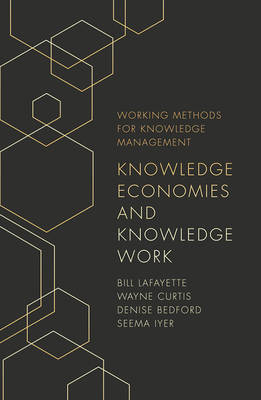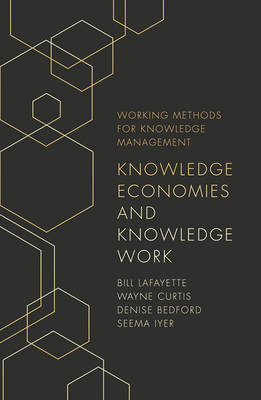
Bedankt voor het vertrouwen het afgelopen jaar! Om jou te bedanken bieden we GRATIS verzending (in België) aan op alles gedurende de hele maand januari.
- Afhalen na 1 uur in een winkel met voorraad
- In januari gratis thuislevering in België
- Ruim aanbod met 7 miljoen producten
Bedankt voor het vertrouwen het afgelopen jaar! Om jou te bedanken bieden we GRATIS verzending (in België) aan op alles gedurende de hele maand januari.
- Afhalen na 1 uur in een winkel met voorraad
- In januari gratis thuislevering in België
- Ruim aanbod met 7 miljoen producten
Zoeken
€ 89,45
+ 178 punten
Omschrijving
Our global economy is going through a major transformation, from an industrial economy, to a knowledge economy, rendering knowledge a primary factor in production. In this practical, real-world focused book, expert authors Bill LaFayette, Wayne Curtis, Denise Bedford and Seema Iyer come together to define and discuss knowledge work.
A common misconception claims that knowledge work is limited to high-skill and technology occupations. The truth is that this growing field applies across all aspects of the economy, which has critical implications on not only macro-, but also micro-levels. As the nature of work is changing, the functions of managing work must also change, as well as our approaches to education and educational organizations. Through a thorough exploration of the functions and structures required to adapt to this change, as well as a close examination of the geography of knowledge, this first book in the Working Methods for Knowledge Management series helps leaders leverage knowledge to better serve their communities, workplaces, and organizations.
This practical book serves as a guide for corporate leaders and managers, knowledge managers, workforce professionals, policy makers, labor economists, human capital researchers, and educators. It helps diverse audiences understand the implications of this transformation and helps them navigate this new economy.
A common misconception claims that knowledge work is limited to high-skill and technology occupations. The truth is that this growing field applies across all aspects of the economy, which has critical implications on not only macro-, but also micro-levels. As the nature of work is changing, the functions of managing work must also change, as well as our approaches to education and educational organizations. Through a thorough exploration of the functions and structures required to adapt to this change, as well as a close examination of the geography of knowledge, this first book in the Working Methods for Knowledge Management series helps leaders leverage knowledge to better serve their communities, workplaces, and organizations.
This practical book serves as a guide for corporate leaders and managers, knowledge managers, workforce professionals, policy makers, labor economists, human capital researchers, and educators. It helps diverse audiences understand the implications of this transformation and helps them navigate this new economy.
Specificaties
Betrokkenen
- Auteur(s):
- Uitgeverij:
Inhoud
- Aantal bladzijden:
- 304
- Taal:
- Engels
- Reeks:
Eigenschappen
- Productcode (EAN):
- 9781789737783
- Verschijningsdatum:
- 24/10/2019
- Uitvoering:
- Paperback
- Formaat:
- Trade paperback (VS)
- Afmetingen:
- 127 mm x 196 mm
- Gewicht:
- 294 g

Alleen bij Standaard Boekhandel
+ 178 punten op je klantenkaart van Standaard Boekhandel
Beoordelingen
We publiceren alleen reviews die voldoen aan de voorwaarden voor reviews. Bekijk onze voorwaarden voor reviews.








